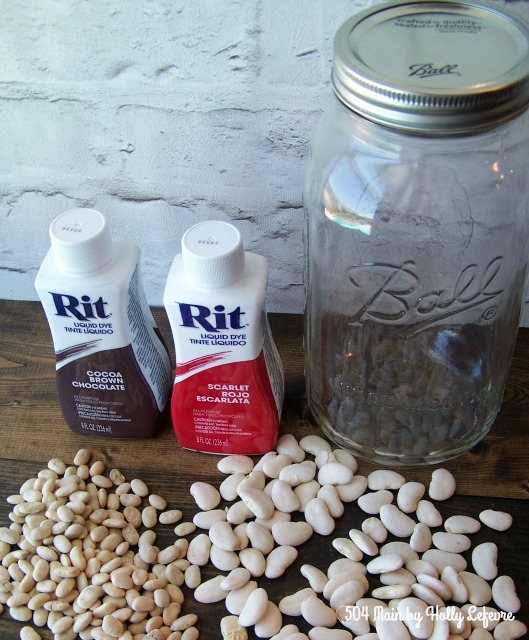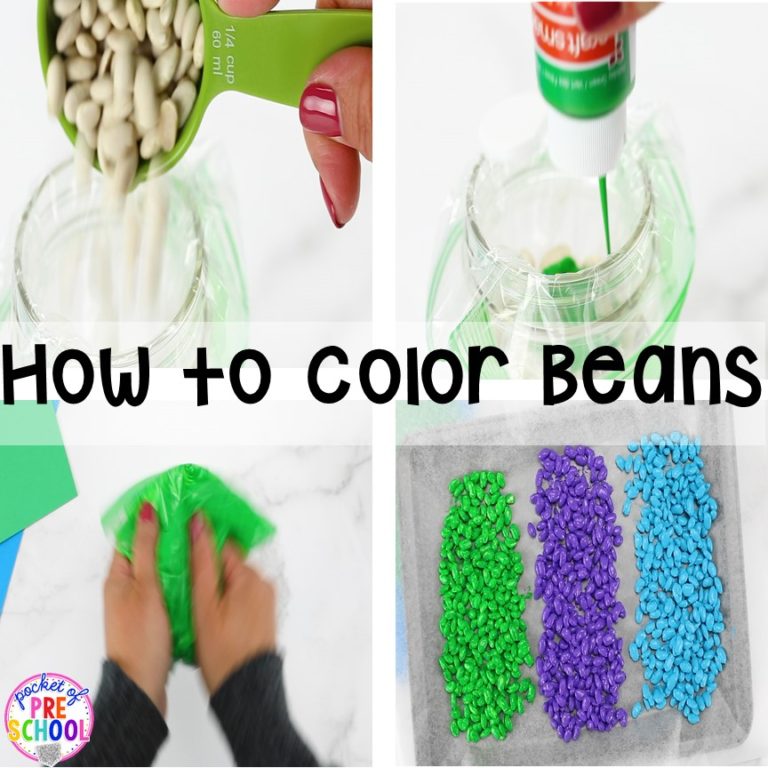Pin on Kids!

How to dye beans for sensory play Active Littles sensoryplay
These will dry just a bit darker, but not much. After adding the food color, zip the top closed - and check it. Squish and shake the bag until you see the color distributed evenly. Pour these onto a paper towel lined baking sheet in a single layer and allow to dry. Depending on your home, this could overnight.

How to dye beans for sensory play Active Littles New Years Activities
Instructions. 1. Prep baking sheets. Set out 1 or 2 baking sheets (depending on how many batches of beans you're dying) and line each one with wax paper. Alternatively, you can use parchment. 2. Combine beans with dye. For each batch of beans, combine 1 cup of dry beans, 1 teaspoon of vinegar, and a generous squirt of food coloring in a zip.

How to Dye Rainbow Beans Discovering Mommyhood
Instructions. Place dried beans in the pot and enough water to cover your black beans. Allow beans to absorb water and add more every couple hours until the beans are no longer absorbing the water. Strain the beans out of the water. (These beans are good to cook now!) Place your damp towel in the dye. (Optional) add baking soda to dye if you'd.

504 Main by Holly Lefevre Unique Holiday Decor How to Dye Beans
Step 1: Place beans in a thick baggie. If you are making small batches, use sandwich-size bags. If you are making a big single-color batch, use a gallon baggie. Any cheap white beans will do. Step 2: Add acrylic paint and close the baggie. Just a few squirts will do.

How to Dye Beans and Make a Mini Sensory Bin Pocket of Preschool
Any cheap chickpeas or garbanzo beans will do. I used these chickpeas from Amazon. Step 2: Add liquid watercolor and close the baggie. Just a few squirts will do. You can also use acrylic paint instead of liquid watercolor if you want, and just follow the same steps below. Step 3: Shake, shake, and shake! Massage the color into the chickpeas.

How to Dye Beans and Make a Mini Sensory Bin Pocket of Preschool
I place the dried beans, rice or pasta into ziplock baggies. I add a few squirts of acrylic paint and one large squirt of hand sanitizer into the bag. Then it's time to shake! My kids love to help with this step. I often will need to add a little more paint to fully coat the pasta. Once everything is fully coated I lay it out to dry on.

Yellow and purple sensory bins for preschool play time. How to dye
make a sensory bin with the colored beans or rice as a base, adding scoops and bowls. put the items in a sensory bottle with small objects to make an I-Spy bottle. set up a marble run and drop the materials through to the bottom. place the items in a ziplock bag with the sides duct taped closed to make a sensory bag.
Metallic Dyed Beans {How to Dye Beans for Sensory Play} And Next
Measure a cup of beans into a container. We used a tupperware (Gladware) container, but a bag would probably also work. Add one cup of beans and 15 drops of whatever food coloring (food dye) color you wish. To get the rainbow of colors you see here I used a combination of regular food coloring and neon food coloring.

How to Dye Beans for Learning Colors Sensory Bin Idea Sensory bins
2 containers of lima beans. and 2 containers of white kidney beans. I could have bought all the same beans but I wanted a variety in texture, size, and shape to encourage that conversation while the kids are playing. To dye the beans you will need rubbing alcohol, ziplock baggies (freezer size), baking trays, parchment paper, and some sort of dye.

How to Dye Beans for Crafts and Sensory Bins Backyard Summer Camp
Small white beans. Put some beans in a bag, add a a few squirts of liquid watercolors, and then shake. Regular liquid watercolors don't seem to dye beans as well as food coloring. However, I find that these metallic liquid watercolors have a thicker consistency, so they did a great job at dyeing the beans. Once the color was evenly distributed.
Metallic Dyed Beans {How to Dye Beans for Sensory Play} And Next
Engage little learners with this fun bean sensory bin! Check out my blog to get all the steps to create this bean sensory bin. https://pocketofpreschool.com/.

Tutorial How to dye beans for your sensory table Sensory table
Pour the beans into a large plastic bag. Squeeze 5-7 drops of liquid watercolors into the bag. Close the bag and shake it up! After all the beans are coated, spread the beans out on a tray. I lined our trays with parchment paper to make clean up easier! Some of the beans will be dried instantly, but others will take just a few minutes to dry.

How to Dye Beans for Learning Colors Sensory Bin Idea Learning colors
Mix it all up until your beans are fully colored. Set the bags aside and bring out 6 pieces of parchment paper. Open your zip loc bags and add each color of lima beans onto each parchment paper. Let the beans dry for about 3 hours or overnight. When they are fully dry, use them for sensory play, pretend play and small world play.

Pin on Kids!
While dying lima beans is super easy, it can take a while for the beans to fully dry, so just keep that in mind! I would definitely recommend making them a few hours to a day before you want to use them in a sensory bin. Step 1. Place 1 cup of lima beans into a ziploc bag. Step 2. Put 1 teaspoon of white vinegar into the bag of lima beans.

How to Dye Beans and Make a Mini Sensory Bin Pocket of Preschool in
To dye beans, just add the desired amount of beans to a zip top baggie. Add some liquid water color or food dye, as well as a squirt of hand sanitizer. Zip up the baggie and shake until the beans are evenly coated. Add more coloring if you desire a darker or more saturated color. Once the desired color is achieved, lay the beans in an even.

How to Dye Beans for Learning Colors Sensory Bin Idea Edible sensory
Step 1: Place one cup of your choice of dry beans into ziploc bags. Step 2: Add one squirt of food dye into each bag. Step 3: Add 1/2 tsp. of rubbing alcohol (or vinegar) into each bag. (Because of the waxy coating on beans I recommend using rubbing alcohol for these colored sensory bins. Step 4: MIX WELL.